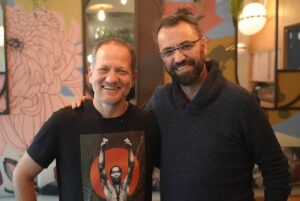Can this conference inspire a new Israeli-Palestinian peace movement?

Maoz Inon (left) and Aziz Abu Sarah (right), Israeli and Palestinian peace activists.
Oren Ziv writes in +972 on 29 June 2024:
Maoz Inon and Aziz Abu Sarah are an unlikely pair. Inon, 49, is an Israeli tourism entrepreneur and the founder of Abraham Hostels. He lost both of his parents, who lived on Kibbutz Netiv HaAsara, during the Hamas-led assault on October 7.
Abu Sarah, 44, is a Palestinian peace activist, journalist, and tourism entrepreneur who founded MEJDI Tours, and a resident of East Jerusalem (and a former +972 contributor). When Aziz was 9 years old, his older brother Taiseer was arrested and held in prison for nearly a year; shortly after his release, Taiseer died of internal injuries he sustained while being tortured in prison.
The two met after Abu Sarah wrote to Inon in the days after October 7, expressing his condolences for Inon’s murdered family. Since then, they have been leading a personal and public campaign against revenge and in favor of reconciliation. They have spoken in media interviews, conferences, and home circles, held an open conversation at a TED conference, and met with diplomats and, recently, with the Pope.
Together with dozens of organizations, Inon is now leading an event titled “It’s Time — The Great Peace Conference,” which will take place on July 1 in Tel Aviv, and is expected to be the largest formal left-wing gathering in recent decades. Delegations representing vast swaths of Israeli and Palestinian society will be in attendance, with artists, politicians, and intellectuals expected to speak. The event will screen a video message from Abu Sarah, who is currently abroad.
In an interview with +972 and Local Call, Inon and Abu Sarah discussed the new peace process they are promoting, the goals of the conference, and how they plan to convince their respective general publics to support their work. The conversation has been edited for length and clarity.
Where did the idea for the conference come from?
Inon: It all started in Geneva in March. Aziz and I were there with 70 other Palestinians and Israelis. We wrote a charter for a common future and started thinking about a road map to achieve peace between the river and the sea. This is the first step, to make the calls for peace and to build legitimacy for the peace process and for us — the leaders of the future.
The conference is the first public event in Israeli society in which Jewish and Palestinian citizens will come out publicly and begin a peace process that derives from the people. This is the first time, at least from what I remember, that more than 50 civil society organizations are working together to build the infrastructure for such a process. Since we aspire to build legitimacy, it will take place in the Menorah Hall and not in demonstrations in the streets. This is just the first event in a series of events we plan to organize.
We have seen protests against the war in recent months, as well as demonstrations calling for a ceasefire. What is the difference between that and the conference?
Inon: We are not against anyone; the demonstrations are important, and some of us participate in them. But this is not a demonstration. We’re changing the framing and talking more about hope and the future. The idea is to build a coalition and work together.
